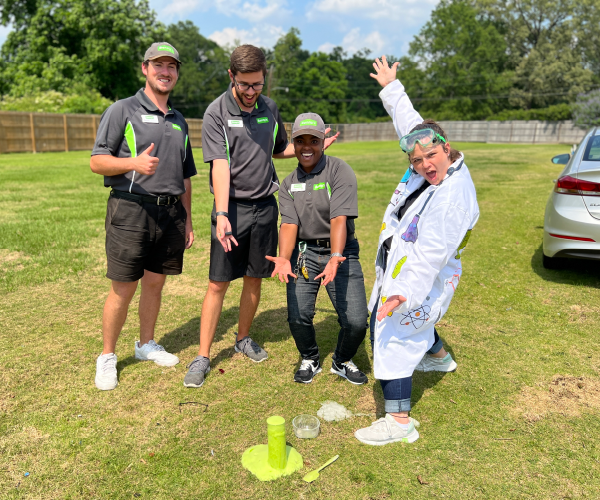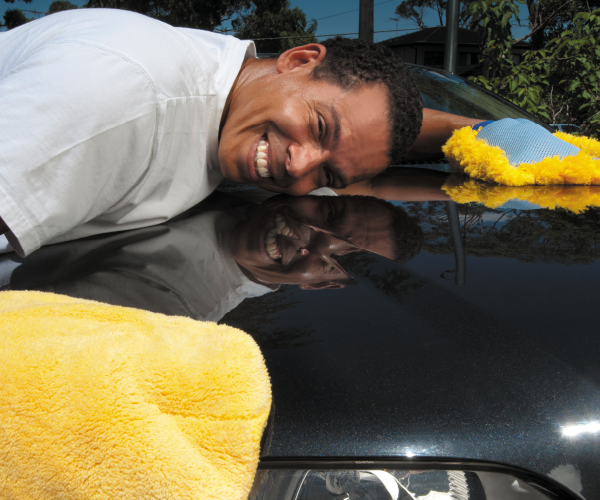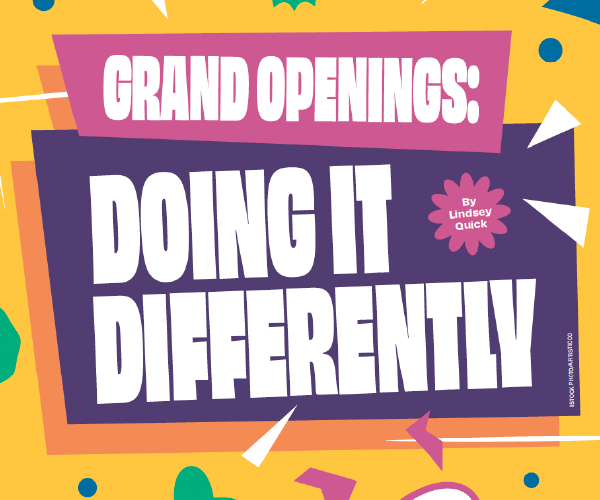
Service with a SMILE
October 1, 2016
9 minute ReadRon Kaufman has a message that might be difficult for some car wash operators to hear: In this highly competitive industry, the quality of your car wash services likely isn’t significantly better or worse than that of your biggest rivals.
Kaufman, a prolific author in the field of customer service whose books include “Uplifting Service” and “UP! Your Service Action Steps” said that aside from having a highly desirable location, the biggest factor fueling a car wash’s success is likely to be its level of customer service, and these days, customers are unwilling to be treated like just another face in the crowd.
“What you’re providing is essentially the same as any other car wash, so it’s not about whether you can do a good job washing my car, it’s about what kind of experience are you going to create for me in the course of washing my car?” Kaufman said. “Customers want personalized service; they don’t want one-size-fits-all. They want to be recognized and appreciated. The words ‘customer’ and ‘customized’ have the same root.”
Here are some expert tips on using customer service to make your car wash stand out from the rest.
Start by choosing your employees wisely.
A car wash operator can gain insight into how a job applicant will treat employees by how he handles the interview process, said Pedro Briceno, leadership development coordinator for Charlotte, North Carolina-based Autobell, which has 76 locations in five states. Is the prospective employee upbeat and positive? If he isn’t that way during a job interview, he likely won’t be that way at the end of a long shift.
“We seek employees who have a good attitude and are willing and able to adapt to our time-tested system,” Briceno said. “At Autobell, we believe in a service attitude. We look for employees who are happy, energetic team players and will do what it takes to ‘wow’ our customers.”
Ensure that employees are properly trained.
Don’t assume that employees have customer-service skills based on their work history, experience as consumers or because they showed manners during the interview process. Tucson, Arizona-based Mister Car Wash, which has 196 locations across the United States, includes video instruction in customer service as part of the employee onboarding process, according to Joe Matheny, the company’s director of field operations.
“These videos set the foundation to ensure employees are following best practices, delivering at a high level of efficiency and give the customer a seamless experience,” Matheny said. “There also is a heavy emphasis on using nonverbal communication to guide the customer through the car-washing process.”
In addition, Mister Car Wash has a “field trainer” program that places the companies’ best customer-service employees in a training role to shadow and work with other employees, he said.
Focus on making a good first impression.
Customers should be greeted with a smile and an upbeat tone that sounds sincere — not canned, over the top or annoyingly sunny — and they should be welcomed to the car wash immediately.
“We teach our employees to approach every customer with a smile and in a friendly manner,” Matheny said. “This sets the stage for a positive interaction. We want to create an environment that is inviting and easy to navigate from a customer perspective, and every employee plays an important part in that customer experience.”
Employees should make eye contact and maintain a positive facial expression when speaking with customers, but they should avoid the kind of blank stare that suggests boredom or a lack of interest or attentiveness. Since so much of our communication is nonverbal, employees should avoid body language that puts distance between them and customers, such as crossing one’s arms or leaning back during a conversation.
“Effective communication is the most important skill set for frontline employees,” said Renee Evenson, author of “Customer Service Training 101.” “To a customer, the frontline employee is the company. How that employee interacts with each customer will define that customer’s perception of the business.”
Though they might be touchy subjects, personal grooming and the use of proper grammar are important in projecting professionalism and a welcoming demeanor, Evenson said. A clean uniform and a professional appearance are key to making a positive first impression. A failure to accomplish that could overshadow any subsequent customer-service initiatives, she said.
Additionally, customers should be thanked for their business and encouraged to come back again, even if they have been unpleasant to deal with.
“While it might seem old fashioned, the simple act of saying ‘please,’ ‘thank you’ and ‘you’re welcome’ rather than ‘you got it,’ ‘sure’ or ‘no problem’ can elevate the customer experience to one that is very professional and friendly,” Matheny said.
When applicable, car wash employees also should be trained to hold open the car door for customers before they depart.
“Taking these simple — and quick —steps to establish a rapport and develop a relationship with customers can make the difference between so-so service and great service, and that is what makes for repeat business,” Evenson said. “At the end of the interaction, showing appreciation leaves a lasting impression in the customer’s mind.”
Notice when a customer is in a hurry.
For busy customers, being able to get in and out of a car wash quickly is almost as important as the quality of the wash, and employees should be trained to notice when a customer is short on time, Kaufman said.
If a customer appears to be in a rush, an employee should be trained to say something like, “Sir, let me do everything I can to make sure we get this done for you as quickly as possible.” Such a statement not only shows a commitment to fast, quality service but absolves the employee of any responsibility to make small talk or engage with the customer on a personal level, which a busy customer might view as annoying or a waste of time, Kaufman said.
“The key is to have the employee ask himself, ‘What does the customer value?’” he said. “You want your service provider to have the sensitivity to ask certain questions, look for certain verbal and nonverbal cues, and then adjust the service they provide accordingly.”
And regardless of whether a customer is in a rush, employees should have a bit of pep in their step.
“Many customers are visiting a professional car wash because of convenience or time factors,” Matheny said. “If our employees aren’t moving with a sense of urgency, we aren’t respecting the time customers have given us out of their day to complete a service.”
Offer a compliment, but only if it is appropriate and sincere.
Frequent car wash customers obviously take pride in having a good-looking, clean car, so if a customer has a sharp-looking car, employees should be encouraged to say so and perhaps ask a question about it. If a customer comes in wearing a suit and tie, an employee could say, “Wow, you look really professional, like you could be running this company,” Evenson said. And if a customer has young children with him, well, most parents like to hear that they have cute kids.
But employees must be vigilant not to offer compliments that appear to be insincere, often repeated or highly personal. Most cars are not worth complimenting, and no customer wants his/her looks to be judged by an employee. “That’s a lovely outfit,” is fine, but, “You look very beautiful/handsome in that outfit,” could easily be construed as crossing the line.
Acknowledge repeat customers.
As difficult as it may be at a busy car wash, employees should try to remember customers’ names and something about them. If a customer comes in with a child in a Little League uniform, for example, an employee could ask how the team is doing upon the customer’s next visit. That kind of personal attention can make customers feel like the employee is really engaged and not just treating each customer like a cog in an assembly line, Evenson said. And employees should introduce themselves to customers by name to make the interaction more personal.
Be aware that others might be listening.
Everyone knows that employees should remain calm, polite and professional even when customers give them a hard time, but that’s not enough, Evenson said.
Employees should be sure not to badmouth difficult customers after they leave, even if another customer remarks about what a jerk the customer was being. If that happens, instead of agreeing with the customer and speaking one’s mind about the interaction, an employee should shrug it off and simply say, “Well, it’s part of the job.” The reason: If an employee badmouths one customer, other customers waiting for their cars might wonder if they also will be criticized once out of earshot.
The same rule applies for employees speaking with one another and for employees speaking with customers they know well. A very frequent customer might feel comfortable telling an employee an inappropriate joke or talking politics, but the employee should be aware that others are listening and might be made uncomfortable. When an employee is focused on his one-on-one interaction with a customer, it can be easy to lose sight of who else is in the room.
“Customers waiting for their car might notice if an employee says the same thing to every customer, making the interaction seem rehearsed and almost robotic,” Evenson said. There are many different ways to say, “Thank you for coming,” and “We appreciate your business.” Change it up when more than one customer is around, she said.
Make sure employees know their options.
If a frontline employee encounters an unsatisfied customer, he shouldn’t necessarily have to get a supervisor to solve the problem, Kaufman said. Employees should know whether they have the power to give the customer a discount, a coupon for a free wash or some added service like a second run through the car wash.
To reflexively call for a manager when a customer is dissatisfied, thereby requiring the customer to explain his situation to a second car wash employee, is not being considerate of a customer’s time, Kaufman said. Often, the frontline employee can solve the problem by himself.
Notice problems with the car.
Attention to detail also suggests to customers that employees are meticulous in their work.
“It won’t add a dime to your bottom line to point out that a customer’s wheels need more air or his left brake light is out, but taking the time to point out problems lets customers know that employees care about them even when there’s nothing in it for the car wash,” Evenson said.
Pay attention to the waiting area.
Messy bathrooms or seating areas suggest to customers that their comfort isn’t paramount to the car wash and that employees might not have the attention to detail required to adequately service their cars. Sloppiness in one area can carry over to another. “The importance of making a good first impression applies not only to your employees but to your facilities,” Kaufman said.
Give customers a chance to provide feedback.
Failing to ask customers’ for feedback indicates to them that their opinions aren’t important to the business. “Having feedback cards and pens readily available, as well as a deposit box allowing customers to submit cards anonymously, will make it more likely that a car wash learns of any customer-service issues before they get out of hand,” Evenson said. Car washes could even incentivize customers to provide feedback by attaching a coupon to the feedback cards.
One rule of thumb is to remind employees to consider how they like to be treated as consumers, Evenson said.
“I define customer service as, ‘Find the best solution for each customer, and find it fast,’ ” she said. “But this does not diminish the fact that customers still like the human touch. It’s crucial to treat each customer as an individual. The bottom line is that managers should never expect employees to know what to do. Always take the time to train them in what to do, and then follow up to ensure that employees are meeting expectations.”








